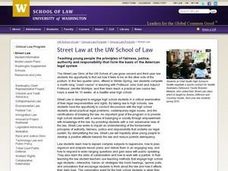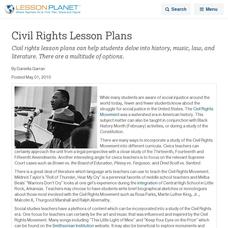Judicial Learning Center
Getting Ready for Trial
A courtroom can be a scary place for the uninitiated. Get familiar with the process using a helpful overview of the activities that take place prior to both civil and criminal cases. The lesson explains the differences between civil and...
Curated OER
Claudette Colvin: Twice Toward Justice
Use the historical account of Claudette Colvin to study civil rights and connect past injustices to modern issues. As learners read, they examine chapter titles, record quotes, and participate in discussion. Next, they research active...
Constitutional Rights Foundation
Criminal Justice in America
The allure of true crime television shows often leads to intrigue of the criminal justice system. Using a six-unit curriculum, learners explore criminology and the justice system in the United States. Topics include the police, trial...
Newseum
The Freedom to Make a Change
As part of a study of the First Amendment, young historians research instances when individuals or groups used the First Amendment to change the United State's laws or policies. Teams are each assigned a different case study. With the...
DocsTeach
Alfred Sinker and the Writ of Habeas Corpus in 1861
Scholars learn how the judicial system treated under-age Civil War soldiers using historical analysis. The resource uses court documents to help historians understand why Habeas Corpus was used in the case of Alfred Sinker and why he was...
Curated OER
Tort Law
Students study the concept of negligence. They recognize the difference between civil and criminal law and examine the factors that courts consider when considering if there is a duty and whether it has been breached. They argue either...
Curated OER
Andrew Jackson and the Use of Martial Law and the Suspension of Habeas Corpus
Students explore the use of martial law at the Battle of New Orleans. In this Andrew Jackson lesson plan, students analyze primary documents pertaining to the move by Jackson to use martial law in the battle. Students then consider...
Teaching Tolerance
Using Photographs to Teach Social Justice | Confronting Unjust Practices
A powerful photograph of the Freedom Riders of 1961 launches an examination of the de jure and de facto injustices that the civil rights movement of the 1950s and 1960s addressed. Young historians first watch a video and read the Supreme...
iCivics
We The Jury
A jury must decide: are the names of two businesses so similar that one is hurt by customer confusion? Learners play the role of a juror who must decide—and convince others—whether Trio Taco and Trio Pizza are too similar. Using...
Curated OER
Civil Liberties and War Powers: Korematsu v. United States
Eleventh graders compare and contrast Supreme Court decisions dealing with the application of civil rights during times of war, with emphasis on discrimination and detention. Working in groups, 11th graders review cases and analyze how...
Cornell College
Dred Scott v. Sandford Supreme Court Decision
Dred Scott was a harbinger of the Civil War. An enslaved man claimed freedom because his owner had taken him into free territory. Not only did the Supreme Court rule that Dred Scott and his wife were to remain enslaved, but it also ruled...
Teaching Tolerance
Racial Disparity in the Criminal Justice System
Explore the impact of the war on drugs in a thought-provoking lesson for high school academics. Young historians delve into the world of the criminal justice system and the racial disparity that occurs in the US. The resource provides...
Curated OER
Government Lesson Plan: Lesson Plan 9
Young scholars examine and compare/contrast the steps of criminal and civil cases. They define key vocabulary terms, develop an outline of a criminal and civil trial, and analyze the differences in standards of proof in legal cases.
Judicial Learning Center
The Players in the Courtroom
Courtrooms are complicated. In addition to the many rules, there are a number of people whose jobs are not very clear to the casual courtroom observer. With the resource, individuals identify some of these roles and review more...
Judicial Learning Center
Your Day in Court
Whether out of choice or necessity, people want to know what will happen on a typical day in court. A helpful lesson walks scholars in the field of criminology through the trial process from opening statements to the final verdict.
National First Ladies' Library
Safety or Civil Liberty? The Trial of Sacco and Vanzet
Students investigate the Sacco-Vanzetti trial and develop a basic understanding of the issues involved. Then they write an essay taking a stance on the Sacco-Vanzetti trial: was the trial fair? were the two men falsely accused? Finally,...
Curated OER
Did Jack break the law?:
Students identify the process for settling a legal dispute, identify key players in a legal dispute (who presents the facts; who makes the final decision) and determine what makes a decision fair.
Curated OER
Individual Rights
Students study the individual rights enshrined in the U.S. Constitution. They determine where these rights come from, and why we value them as we do. They consider that our individual rights are not absolute, and may be limited by other...
Curated OER
Torts: Intentional Torts
High schoolers are introduced to the concept of intentional torts. In groups, they compare and contrast civil and criminal wrongs committed by people. They are given case studies and use the elements of torts to apply to them. They share...
Curated OER
Civil Rights Lesson Plans
Civil rights lesson plans can help students delve into history, music, law, and literature. There are a multitude of options.
Curated OER
Rights In Conflict
Students analyze three different case studies, which involve conflict situations, identify the rights in conflict in each case, and decide what to do when the rights of two or more people conflict.
iCivics
We the Jury
Learners take on the roles of jurors in a civil case to evaluate evidence and determine a verdict in this engaging online interactive experience.
Federal Judicial Center
Amistad and Dred Scott—a Comparative Activity
What do slaves fighting for their freedom on board a ship and a slave fighting for his freedom in a courtroom have in common? Budding historians investigate the two different cases of the Amistad slave revolt and the Dred Scott argument....
Curated OER
Tort Law -- Negligence
Students review the differences between criminal and civil law. In groups, they examine high-profile cases and identify any act of negligence. They create a list of the elements of negligence and answer discussion questions as they watch...

























